Classics and the Western Canon discussion
Divine Comedy, Dante
>
Purgatorio 20-21: Avarice and Prodigality
date newest »
newest »
 newest »
newest »
I would imagine that cantos like this one were a delight to read in Dante's time. There is not only the beautiful language and the uplifting message, but also the wonderful weaving in of historical and "historical" facts and figures which truly, truly enhance the reading experience.
Admittedly, I had little no no knowlegde of Hugh Capet, etc. But I was familiar with the story of Mary giving birth in humble surroundings. And I was, oooh, I know the story of Midas (L. 106)...Crassus. I LOVED the reference to Polydorus! And I had just read Acts 5 a couple days ago so when I saw the name Sapphira it was quite cool. Hey! I know that name!
Just think it must have been such enjoyable reading for the educated of Dante's day.
Admittedly, I had little no no knowlegde of Hugh Capet, etc. But I was familiar with the story of Mary giving birth in humble surroundings. And I was, oooh, I know the story of Midas (L. 106)...Crassus. I LOVED the reference to Polydorus! And I had just read Acts 5 a couple days ago so when I saw the name Sapphira it was quite cool. Hey! I know that name!
Just think it must have been such enjoyable reading for the educated of Dante's day.
 At the end of Canto 21, Statius bends to kiss the feet of Virgil and Virgil forbids him, just as at the end of Canto 19 Dante had knelt before Pope Adrian, who told him not to. There is equality in Purgatory.
At the end of Canto 21, Statius bends to kiss the feet of Virgil and Virgil forbids him, just as at the end of Canto 19 Dante had knelt before Pope Adrian, who told him not to. There is equality in Purgatory.
 By the way, we met hoarders and wasters in the 4th circle of the Inferno. Here in the 5th circle of Purgatory we seem to have more of the same. What's the difference?
By the way, we met hoarders and wasters in the 4th circle of the Inferno. Here in the 5th circle of Purgatory we seem to have more of the same. What's the difference?
 At the beginning of Canto 20, we hear more about the voracious she-wolf who only grows hungrier the more she eats. Surely she represents avarice, being mentioned while Dante is on this circle. But what are we to make of the final remark, "When will he come, from whom the wolf must flee?" Is this Christ or Can Grande?
At the beginning of Canto 20, we hear more about the voracious she-wolf who only grows hungrier the more she eats. Surely she represents avarice, being mentioned while Dante is on this circle. But what are we to make of the final remark, "When will he come, from whom the wolf must flee?" Is this Christ or Can Grande?
 By the way, Canto 20 opens with Dante reluctantly leaving Pope Adrian, his thirst for knowledge like an unfilled sponge drawn from water. His abiity to leave constrasts with the unwillingess of the denizens of this circle to leave their wealth.
By the way, Canto 20 opens with Dante reluctantly leaving Pope Adrian, his thirst for knowledge like an unfilled sponge drawn from water. His abiity to leave constrasts with the unwillingess of the denizens of this circle to leave their wealth.
 In Canto 21 Statius answers the question that some have voiced, of how one gets assigned to a circle in Purgatory and how one advances. Apparently each soul is moved by divinely-planted desire to stay on each circle just as long as necessary to remove the applicable sin. Then he feels ready to move on, and all the people rejoice and the mountain shakes. Then presumably he goes to the next circle for further cleansing, as necessary. Statius says he has been confined for 500+ years, though it is about 1200 years since he died; presumably he spent the other 700 or so years in circles 1-4, or perhaps in ante-Purgatory.
In Canto 21 Statius answers the question that some have voiced, of how one gets assigned to a circle in Purgatory and how one advances. Apparently each soul is moved by divinely-planted desire to stay on each circle just as long as necessary to remove the applicable sin. Then he feels ready to move on, and all the people rejoice and the mountain shakes. Then presumably he goes to the next circle for further cleansing, as necessary. Statius says he has been confined for 500+ years, though it is about 1200 years since he died; presumably he spent the other 700 or so years in circles 1-4, or perhaps in ante-Purgatory.
Roger wrote: "By the way, we met hoarders and wasters in the 4th circle of the Inferno. Here in the 5th circle of Purgatory we seem to have more of the same. What's the difference?"
I noticed that too.
Inferno--------------------Purgatorio:
Limbo ----------------------- The Proud
Lust -------------------------The Envious
Gluttony/Greed/Sloth-----------The Wrathful
Anger--------------------------The Slothful
Heresy--------------------------The Covetous
-------------------------------The Gluttonous
Violence
Fraud-------------------------The Lustful
Treachery
Glottony, Wrathfulness, Sloth, Lust ... appear to be absolute sins. Those in Purgatory committed those sins. But those in Purgatory accepted Christ prior to their deaths; and so those sins have been paid for/ wiped away. They can climb to Heaven; but they must purify themselves first.
Those in the Inferno, having rejected or never accepted Christ. Their sins have never been paid for or wiped away. Sinners can not reside in the presence of God. And now that they are dead, it's too late for them.
Mmmm. But that explanation doesn't really hold. Because I would think that not everyone would have had a priest at their death bed to give them last rites and get those last sins taken off the books, as it were.
So what about the people who had say a week's worth of unconfessed sins and they died without benefit of a priest. They would be carrying these sins when they died, yes?
(EDIT ADDED. Yes. The ARE carrying the sins when they died. Canto 20: "the mass of souls whose eyes were, drop by drop, shedding the sin..." Line 7).
So maybe the explanation is very simply that those in Hell never accepted Christ's invitation--and one can't crash Heaven.
Whereas those in Purgatory accepted the invitation---but aren't yet pure enough to stand in God's presence.
I noticed that too.
Inferno--------------------Purgatorio:
Limbo ----------------------- The Proud
Lust -------------------------The Envious
Gluttony/Greed/Sloth-----------The Wrathful
Anger--------------------------The Slothful
Heresy--------------------------The Covetous
-------------------------------The Gluttonous
Violence
Fraud-------------------------The Lustful
Treachery
Glottony, Wrathfulness, Sloth, Lust ... appear to be absolute sins. Those in Purgatory committed those sins. But those in Purgatory accepted Christ prior to their deaths; and so those sins have been paid for/ wiped away. They can climb to Heaven; but they must purify themselves first.
Those in the Inferno, having rejected or never accepted Christ. Their sins have never been paid for or wiped away. Sinners can not reside in the presence of God. And now that they are dead, it's too late for them.
Mmmm. But that explanation doesn't really hold. Because I would think that not everyone would have had a priest at their death bed to give them last rites and get those last sins taken off the books, as it were.
So what about the people who had say a week's worth of unconfessed sins and they died without benefit of a priest. They would be carrying these sins when they died, yes?
(EDIT ADDED. Yes. The ARE carrying the sins when they died. Canto 20: "the mass of souls whose eyes were, drop by drop, shedding the sin..." Line 7).
So maybe the explanation is very simply that those in Hell never accepted Christ's invitation--and one can't crash Heaven.
Whereas those in Purgatory accepted the invitation---but aren't yet pure enough to stand in God's presence.
Roger wrote: "In Canto 21 Statius answers the question that some have voiced, of how one gets assigned to a circle in Purgatory and how one advances. ....Statius says he has been confined for 500+ years, though it is about 1200 years since he died; presumably he spent the other 700 or so years in circles 1-4, or perhaps in ante-Purgatory.
..."
You thought of doing the math!
..."
You thought of doing the math!
 Forgive me, I'm a mathematician of sorts. Though my students will tell you I'm incapable of arithmetic. I can only do theorems.
Forgive me, I'm a mathematician of sorts. Though my students will tell you I'm incapable of arithmetic. I can only do theorems.
Roger wrote: "Forgive me, I'm a mathematician of sorts. Though my students will tell you I'm incapable of arithmetic. I can only do theorems."
No, I thought I was great that you thought of doing the math!
No, I thought I was great that you thought of doing the math!
 Adelle wrote: "I would imagine that cantos like this one were a delight to read in Dante's time. There is not only the beautiful language and the uplifting message, but also the wonderful weaving in of historica..."
Adelle wrote: "I would imagine that cantos like this one were a delight to read in Dante's time. There is not only the beautiful language and the uplifting message, but also the wonderful weaving in of historica..."And books like this become more delightful each time we read them, because we recognize more familiar things each time from both the previous reading and our readings in other classics.
 Roger wrote: "By the way, we met hoarders and wasters in the 4th circle of the Inferno. Here in the 5th circle of Purgatory we seem to have more of the same. What's the difference?"
Roger wrote: "By the way, we met hoarders and wasters in the 4th circle of the Inferno. Here in the 5th circle of Purgatory we seem to have more of the same. What's the difference?"I think of the Prodigal (spendthrift) Son. The Father welcomes him back, just as He does to those in Purgatory. Not so those who are unrepentant and thus in Hell.
 Roger wrote: "At the end of Canto 21, Statius bends to kiss the feet of Virgil and Virgil forbids him, just as at the end of Canto 19 Dante had knelt before Pope Adrian, who told him not to. There is equality i..."
Roger wrote: "At the end of Canto 21, Statius bends to kiss the feet of Virgil and Virgil forbids him, just as at the end of Canto 19 Dante had knelt before Pope Adrian, who told him not to. There is equality i..."Good catch, Roger!
 No Blake illustrations found for these cantos.
No Blake illustrations found for these cantos.http://www.worldofdante.org/media/ima...
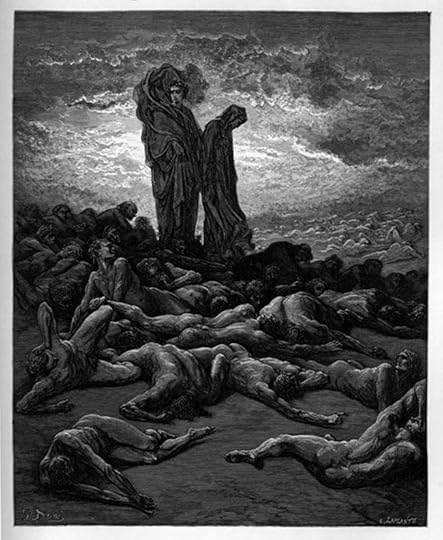
Gustave Doré: Purgatorio Canto XX.16. “Among the Avaricious and Prodigal.” c.1868. Engraving.
(No Doré is designated for Canto 21.)
 http://www.worldofdante.org/media/ima...
http://www.worldofdante.org/media/ima...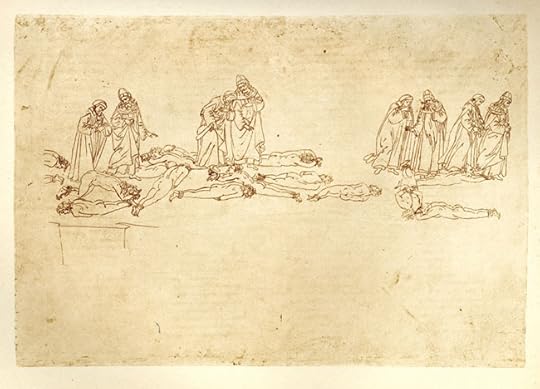
Sandro Botticelli: Purgatorio Canto XX.1. “Penance of Avaricious and Prodigal, Meeting with Hugh Capet.” c.1480 - c.1495. Drawing.
"Ugo Capeto: Dante's Hugh Capet is a conflation of two persons, Hugh Capet the Great and his son, also named Hugh. Dante presents Hugh as the progenitor of a long line of Capetian rulers."
 http://www.worldofdante.org/media/ima...
http://www.worldofdante.org/media/ima...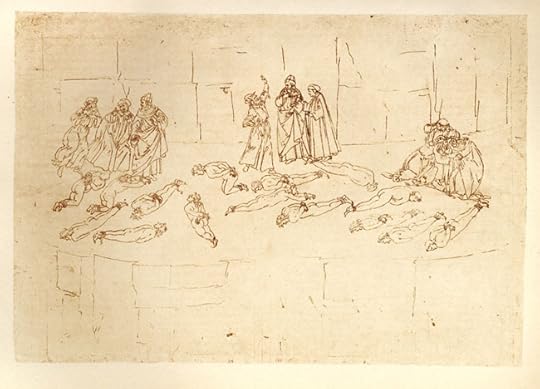
Sandro Botticelli: Purgatorio Canto XXI.1. “Terrace of Avaricious and Prodigal: Statius.” c.1480 - c.1495. Drawing.
 http://www.worldofdante.org/media/ima...
http://www.worldofdante.org/media/ima... 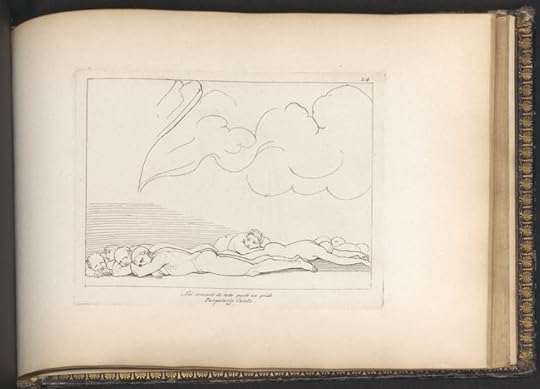
John Flaxman: Purgatorio Canto XX.133. “Mountain Reverberates with the Shout Announcing the Liberation of a Soul.” 1793. Engraving.
 http://www.worldofdante.org/media/ima...
http://www.worldofdante.org/media/ima...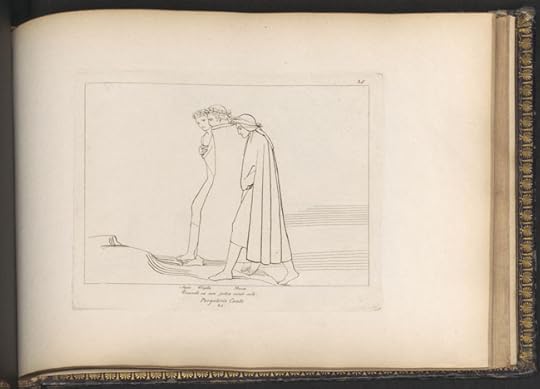
John Flaxman: Purgatorio Canto XXI.70. “Statius Joins Dante and Virgil.” 1793. Engraving.
 Lily wrote: "http://www.lockportstreetgallery.com/...
Lily wrote: "http://www.lockportstreetgallery.com/...Salvador Dali: Purgatorio Canto 20. ”The Avaricious.”"
Just look at those faces!
 Lily wrote: "http://www.worldofdante.org/media/ima...
Lily wrote: "http://www.worldofdante.org/media/ima... John Flaxman: Purgatorio Canto XX.133. “Mountain Reverberates with the Shout Announcing the Liberation of a Soul.” 1793. ..."
I love this part!
 I was a bit startled to hear Hugh Capet say
I was a bit startled to hear Hugh Capet say"O my Lord, when shall I be gladdened
at the sight of vengeance that, as yet concealed,
hidden in your mind, makes sweet your wrath? "
He is in the process of being purified. Why does this hatred, or desire to see another punished, so rankle him? Isn't this what he's supposed to be being purged of? Do those in Heaven still hate others so that they long to see them punished?
I suppose we'll learn the answer to that as we read Paradise, but I would frankly be disappointed if those in Paradise are still longing to see others punished.
 Roger wrote: "By the way, we met hoarders and wasters in the 4th circle of the Inferno. Here in the 5th circle of Purgatory we seem to have more of the same. What's the difference?"
Roger wrote: "By the way, we met hoarders and wasters in the 4th circle of the Inferno. Here in the 5th circle of Purgatory we seem to have more of the same. What's the difference?"The difference presumably is that those still in the Inferno never accepted Christ, and those in Purgatory did. Same basic sin, but what differs is the status of the sinner.
You really do need circles in both Hell and Purgatory for every major sin, don't you, so that those in Hell can be permanently punished for having sinned but never repented and accepted Christ, and those in Purgatory are only temporarily punished for having sinned the same sin but, having accepted Christ, can purge the sin, end their punishment, and move into Paradise.
 Adelle wrote: "I would imagine that cantos like this one were a delight to read in Dante's time. There is not only the beautiful language and the uplifting message, but also the wonderful weaving in of historica..."
Adelle wrote: "I would imagine that cantos like this one were a delight to read in Dante's time. There is not only the beautiful language and the uplifting message, but also the wonderful weaving in of historica..."I agree that it was interesting to read (or in my case to hear) the litany of historical and perhaps mythical people which those on this level repeated continuously. This is the first instance I recall of the purgatorees (if I may be allowed to coin such a term) bringing up so many historical figures that they think about during their circling of the mountain.
What I also find interesting is that presumably Dante expected his audience to know who most, if not all, of these figures were. But for modern readers, this canto has one of the most extensive set of notes I can recall!
 Adelle wrote: " There is not only the beautiful language and the uplifting message, but also the wonderful weaving in of historical and "historical" facts and figures"
Adelle wrote: " There is not only the beautiful language and the uplifting message, but also the wonderful weaving in of historical and "historical" facts and figures"Although Musa notes that scholars agree (he says that "all" are agreed -- when have "all" scholars ever agreed on anything? [g]) that Dante's knowledge of late tenth-century French history was "inadequate."
edit: is this the first time Dante has ventured beyond Italian/Roman or Greek history?
 I was a bit startled to hear Hugh Capet say
I was a bit startled to hear Hugh Capet say"O my Lord, when shall I be gladdened
at the sight of vengeance that, as yet concealed,
hidden in your mind, makes sweet your wrath? "
He is in the process of being purified. Why does this hatred, or desire to see another punished, so rankle him? Isn't this what he's supposed to be being purged of? Do those in Heaven still hate others so that they long to see them punished?
I suppose we'll learn the answer to that as we read Paradise, but I would frankly be disappointed if those in Paradise are still longing to see others punished.
It reminds me of the times Virgil scolded Dante for pitying the sinners in hell. The gleeful anticipation of someone else's punishment is a step further, though.
edit: is this the first time Dante has ventured beyond Italian/Roman or Greek history?
Aside from Biblical history, I think there were rulers from Germany and Bavaria in the valley of princes earlier in purgatory.
 Nowadays there's a common feeling that one ought to feel sorrowful regret at the sad necessity of violence when good triumphs physically over evil. That was not Dante's feeling at all. He exulted in the victory of holy and righteous wrath, saw no sin in the feeling, and expected others to share it.
Nowadays there's a common feeling that one ought to feel sorrowful regret at the sad necessity of violence when good triumphs physically over evil. That was not Dante's feeling at all. He exulted in the victory of holy and righteous wrath, saw no sin in the feeling, and expected others to share it.
 Well, I must say it's quite a coincidence that the shade they meet now just happens to be a) the one for whom the mountain trembled, and b) the great admirer of Virgil.
Well, I must say it's quite a coincidence that the shade they meet now just happens to be a) the one for whom the mountain trembled, and b) the great admirer of Virgil. Musa contends that Statius "appears here like the risen Christ, Virgil and the Pilgrim being like the two apostles surprised on the road to Emmaus." I admit that that interpretation would never have occurred to me. Did it occur to anybody else? Is this interpretation persuasive to you?
 Laurele wrote: "Lily wrote: "http://www.worldofdante.org/media/ima...
Laurele wrote: "Lily wrote: "http://www.worldofdante.org/media/ima... John Flaxman: Purgatorio Canto XX.133. “Mountain Reverberates with the Shout Announcing the Liberation of a soul."
"I love this part! .."
But, much as I like Flaxman in general, this is one sketch where, for me, he fell short of capturing the joy of the theme he was choosing to illuminate.
 Laurele wrote: "Lily wrote: "http://www.lockportstreetgallery.com/...
Laurele wrote: "Lily wrote: "http://www.lockportstreetgallery.com/...Salvador Dali: Purgatorio Canto 20. ”The Avaricious.”"
Just look at those faces!"
One of which could be construed as having a semblance of Dali's own distinguishing mustache?
 Everyman wrote: "Well, I must say it's quite a coincidence that the shade they meet now just happens to be a) the one for whom the mountain trembled, and b) the great admirer of Virgil.
Everyman wrote: "Well, I must say it's quite a coincidence that the shade they meet now just happens to be a) the one for whom the mountain trembled, and b) the great admirer of Virgil. Musa contends that Statiu..."
I would say Providence, not coincidence.
 Roger wrote: "By the way, we met hoarders and wasters in the 4th circle of the Inferno. Here in the 5th circle of Purgatory we seem to have more of the same. What's the difference?"
Roger wrote: "By the way, we met hoarders and wasters in the 4th circle of the Inferno. Here in the 5th circle of Purgatory we seem to have more of the same. What's the difference?"I see that Adelle, Laurele and Everyman have answered already. Here are my two cents:
The difference is the grace of God, which, according to Augustine, restores fee will in man and enables him to desire and attain the Good.
Firstly, those in the Inferno are confined to their circle, and never able to escape, because they rejected the grace of God, and thereby renounced freedom; those in the Purgatorio, are free to progress to higher circles as soon as their purification is complete.
Secondly, those in the Inferno are punished against their will, but those in the Purgatorio are purified in accordance with their will, as C.S.Lewis explained in the passage on Purgatory you quoted a while back.





http://danteworlds.laits.utexas.edu/p...